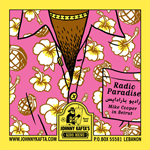|
|
 |
Dusted Reviews
Artist: Mike Cooper Album: Radio Paradise: Mike Cooper in Beirut Label: Johnny Kafta’s Kids Menu Review date: Apr. 5, 2012 |

|
|
|
 |
Where Mike Cooper’s concerned, you can pretty much forget that tired saw about old dogs and new tricks. Cooper was a part of the British acoustic blues scene in the 1960s, but while he’s well-versed in blues history and folk traditions, Cooper, now almost 70, long ago forsook the path of musical “purity” that can render one little more than a historical reenactor. His most recent work, much of which has been issued on Cooper’s own Hipshot imprint, has paired his tricone resonators with electronics that twist the strands of traditional folk and blues into a tangled nest. It’s music that can be strikingly simple or as colorfully busy as its performer’s trademark Hawaiian shirts, focusing Cooper’s knowledge and reverence of his forebears through a prism of experimentation and improvisation, aiming to loose the music from the restrictive shackles of more orthodox modern-day practitioners.
Originally approached by the folks at Johnny Kafta’s to make a live recording on his next trip to Lebanon, Cooper demurred, opting instead to enter Beirut’s Tunefork studios for a pair of sessions, from which Radio Paradise was born. Cooper’s guitar work is often obscured by its own real-time modulation, his manipulation of the strings lost in the electronics’ manipulation. The looping, pitch-shifting, and other mutation of the lap steel guitar reveals hypnotic rhythms and unexpectedly pretty melodic fragments; reversed lines fold back in upon themselves and spindly arrays of notes splatter in echoed arcs.
Radio Paradise’s instrumental interludes are many, but it’s Cooper’s vocals that tend to stick out. The disc features what Cooper calls his “Spirit Songs,” lyrical cut-ups of Pynchon quotes and other textual detritus, as well as some well-disguised covers. There’s no shame in failing to recognize the album’s borrowed source material, so thoroughly (and sometimes tenuously) does Cooper sever it from its original form. Whether performing his originals or reworking Delta blues classics, Cooper’s is an especially loose variation on the traditional blues delivery. Like a traveler setting out without a map, Cooper charts his vocal excursions in the moment, independent of the music, which usually doesn’t offer much in the way of structural stability anyway. It’s unchained melody far beyond anything conceived by the Righteous Brothers.
It’s common to find strains of the blues in experimental music, but rarely is the genre so squarely engaged as it is on Radio Paradise. While the music is undoubtedly too purposefully deviant from the norm to appeal to most disciples of conventional Delta blues, Cooper’s vocals ensure that there’s no question from whence it came. Any artist heading into their eighth decade could be forgiven for finding solace in the safety of what they know, but no matter his age, Cooper, in both music and sartorial style, isn’t the conservative type.
By Adam Strohm
|







